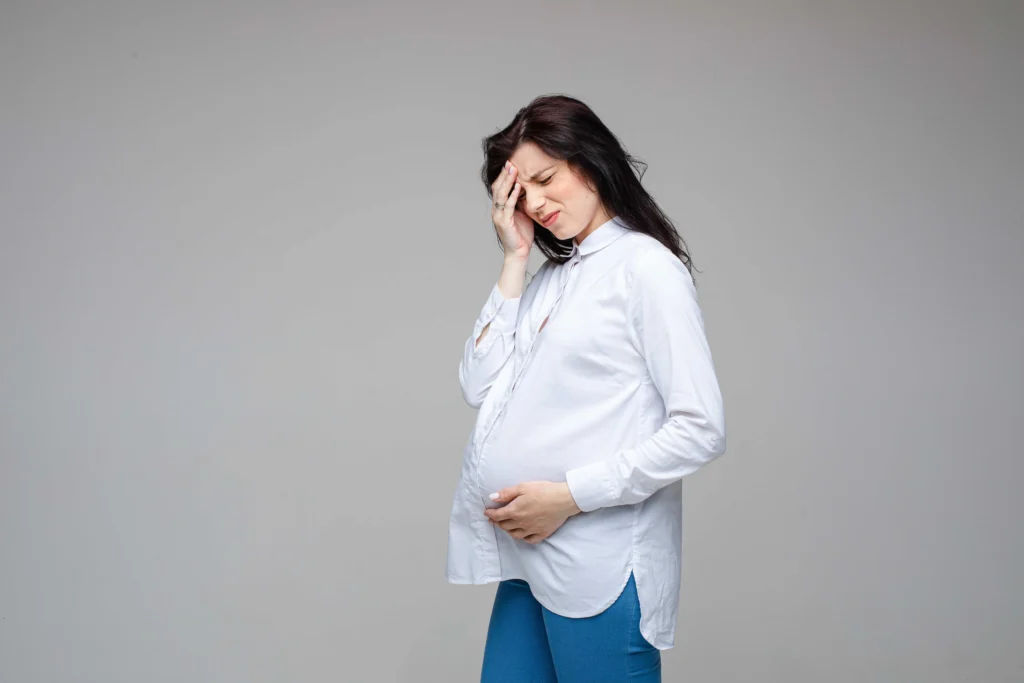Preeclampsia Symptoms, Causes and Prevention Tips

Preeclampsia is one of the leading causes of pregnancy-related complications worldwide, yet many women don’t recognise the symptoms until it becomes a serious concern.
Marked by high blood pressure and signs of potential organ damage, preeclampsia demands prompt medical attention.
In this blog, we’ll explain everything you need to know about preeclampsia, including how to spot it early, what causes it, and what you can do to reduce your risk.
Understanding Preeclampsia
Preeclampsia is a pregnancy complication that usually occurs after the 20th week of gestation. It’s marked by high blood pressure (hypertension) and elevated protein levels in urine, indicating kidney damage or other organ damage.
If left untreated, it can pose serious or even life-threatening outcomes for both the mother and the baby.
Preeclampsia Signs and Symptoms
The defining feature of preeclampsia is high blood pressure.
Often, it presents without obvious symptoms, which is why it’s commonly first identified during routine prenatal checkups with your obstetrician.
Along with high blood pressure, preeclampsia symptoms may include:
- Swelling in the hands, feet, or face
- Severe headaches that don’t go away with medication
- Changes in vision, like blurriness or light sensitivity
- Upper abdominal pain, often under the ribs on the right side
- Nausea or vomiting, especially in later pregnancy stages
- Sudden weight gain over a few days
- Shortness of breath or chest pain
Severe preeclampsia may present with additional signs like:
- Hypertensive emergency (blood pressure of 160/110 mmHg or higher)
- A decrease in kidney or liver function
- Fluid in your lungs (pulmonary oedema)
- Low blood platelet levels
- Not producing or producing very little urine .
If you notice any of these preeclampsia symptoms, seek medical attention immediately. Early detection and monitoring are key to protecting your health and your baby’s well-being.
Causes of Preeclampsia
The exact cause of preeclampsia is not entirely understood, but it’s believed to stem from problems in the development of blood vessels in the placenta. These vessels may be narrower than normal or not respond properly to hormonal signals of pregnancy.
Factors that increase the risk include:
- History of high blood pressure or diabetes
- Family history of preeclampsia
- Multiple pregnancies (twins or triplets)
- Chronic hypertension or kidney disease
- Autoimmune disorders such as lupus
- Being pregnant for the first time
- Obesity
- Advanced maternal age (over 35)
- Complications in prior pregnancies, such as low birth weight
Complications of Preeclampsia for both Mother and Baby
If you’re pregnant, preeclampsia can lead to some of the most serious complications, including:
- Eclampsia – the onset of seizures
- HELLP Syndrome – a severe form of preeclampsia characterised by hemolysis, elevated liver enzymes, and lower platelet count
- Kidney, lung, heart or other organ damage
- Stroke
- Long-term cardiovascular risk post-pregnancy
The most common complications to the fetus are:
- Fetal growth restriction
- Premature birth
- Low birth weight
- Placental abruption – a condition where the placenta separates from the uterine wall
Diagnosing Preeclampsia
Preeclampsia is typically diagnosed during a routine prenatal appointment, where your obstetrician monitors weight gain and blood pressure.
If your provider suspects preeclampsia, they may:
- Order It’s tests to check kidney and liver functions and platelet levels.
- Conducting a 24-hour urine test to detect proteinuria (protein in the urine).
- Perform an ultrasound and fetal monitoring to assess the baby’s growth and amniotic fluid levels.
Managing Pregnancy with Preeclampsia
Near full term (37 weeks)
If you’re nearing full term, your obstetrician will likely recommend an early delivery.
While vaginal delivery is possible, a C-section may be safer in severe pre eclampsia. Medication may be given to support the baby’s lung development and manage your blood pressure until delivery.
In some situations, early delivery may be the safer option rather than prolonging pregnancy.
Managing Early-stage Preeclampsia
For those who develop preeclampsia earlier in pregnancy, your provider will closely monitor you to extend the pregnancy as long as possible for the baby’s growth.
Expect more frequent prenatal visits, including ultrasounds, urine tests, and blood work.
You may also need to monitor your blood pressure. If the condition worsens, your provider will recommend delivery.
Prevention Tips for Preeclampsia
If you have risk factors for preeclampsia, taking proactive steps before and during pregnancy can help reduce your chances of developing the condition.
These steps can include:
- Attend all prenatal appointments
- Maintain a healthy weight prior to pregnancy
- Limit salt and processed foods
- Getting enough sleep
- Exercise regularly with your doctor’s approval
- Eat a healthy, balanced diet and limit salt and caffeine intake
- Take prescribed low-dose aspirin if recommended by your doctor
- Managing conditions like diabetes or hypertension
Prioritise Prenatal Health to Protect Mother and Baby from Preeclampsia
If you’re navigating a high-risk pregnancy or seeking specialised care, Dr Aparna Devi Gumma, a trusted female gynaecologist in Dubai, is here to support you with over 28 years of expertise in obstetrics and gynaecology, as well as advanced laparoscopic techniques, Dr Aparna is dedicated to providing the highest level of care for women through every stage of pregnancy and beyond.
Ensure a healthy and safe pregnancy by consulting with Dr Aparna Devi Gumma today.
About Dr Aparna
Dr Aparna Devi Gumma, female gynaecologist in Dubai, is one of the most trusted partners in women’s health with over 28 years of expertise as an Ob-Gyn and Advanced Gynecologic Laparoscopic Surgeon.
Related Blogs

Types of vaginal discharge: What do they mean?
Types of vaginal discharge: What do they mean? Vaginal discharge is a normal, healthy, and essential part of the female reproductive system. It’s the body’s natural way of cleaning and lubricating the vagina, protecting against infection. However, changes in its colour, consistency, or smell can often be the first sign

The Menopause Diet: 5-Day Plan to Lose Weight
The Menopause Diet: 5-Day Plan to Lose Weight For many women, the midlife years bring a frustrating mix of hot flashes, mood swings, and gradual weight gain around the middle. The 5 day menopause meal plan to lose weight is not a “quick fix” diet, but a structured way to

Egg Freezing & Fertility Preservation | Process, Cost, Ideal Age & Success Rate
Egg Freezing & Fertility Preservation | Process, Cost, Ideal Age & Success Rate Guide to Future Parenthood – Preserve your dreams of motherhood! Dreaming of motherhood, but waiting to establish your career, undergoing any medical procedures that affect fertility, or yet to accomplish your life goals? Egg freezing or egg

VBAC Vaginal Birth After C-Section Dubai: Options & Expert Guide
VBAC Vaginal Birth After C-Section Dubai: Options & Expert Guide Have you had a C-section before and are now wondering if a natural birth could be possible for your next delivery? For many women, the idea of giving birth vaginally after a previous caesarean brings a sense of empowerment and

